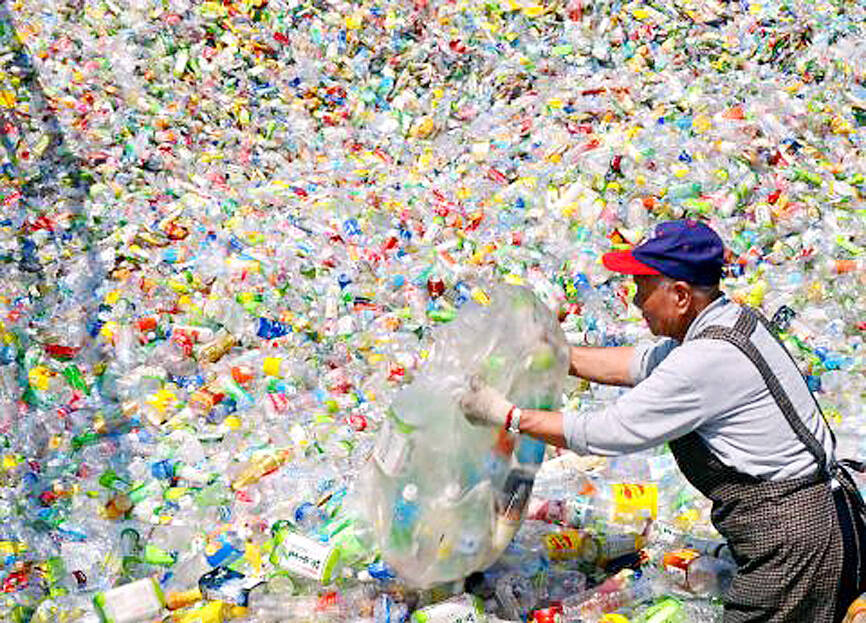A study by Taiwanese researchers showed a correlation between microplastics and decreased levels of brain-derived neurotrophic factor (BDNF) in seabird chicks.
BDNF is a protein that can influence susceptibility to neurodegenerative diseases such as Alzheimer’s disease.
The study examined protein expressions in blood and organs of an Australian seabird species’ chicks, National Cheng Kung University food safety and risk management associate professor Hsu Wei-hsuan (徐瑋萱) said on Saturday.

Photo: Sam Yeh, AFP
It divided the chicks into high and low exposure groups based on the amount of plastic in their stomach, she said.
Results showed that chicks with higher plastic intake had bigger changes in the levels of several proteins, particularly BDNF, which significantly declined in the high exposure group, Hsu said.
BDNF is closely linked to the memory, learning ability and neurodegeneration of human beings, she added.
“The seabirds did not have Alzheimer’s disease, given that it is not a disease in birds. Nor can we say it [decreased BDNF in chicks] is due to microplastic ingestion,” Hsu said.
As the research was conducted on seabirds that ingested plastics in the wild instead of under controlled conditions, it could only show correlations or potential risks, but could not conclude causation, she said.
The study cannot prove that “plastic intake is harmful to the brain,” Hsu added.
Asked whether humans would also be similarly affected, she said that no direct evidence showed that microplastics would harm the human body, although studies have found residual microplastics in people’s blood, placenta and brain.
“We cannot experiment on humans, and plastics vary in texture, size and sources, and can absorb heavy metals or toxins, making it difficult to prove their effects on human beings,” Hsu added.
“For example, microplastics larger than 100 micrometers are usually excreted from the body, but those smaller than 20 micrometers or at the nanometer level might pass through the intestinal wall and stay in the body,” she said.
Although animal experiments have shown microplastics’ negative impacts on the liver, kidney, brain and the reproductive system, they were controlled experiments, Hsu said, adding that they were not the same as human beings’ plastic exposure.
So far, microplastic-related research has yet to amount to anything, as they chose microplastics of various textures and sizes and applied experimental methods that were widely different, she said.
A specific dose toxicity standard is still lacking, she added.
However, research showed that microplastics have already infiltrated daily life, from vegetables and seafood to clothes and objects, Hsu said.
Risks remain even though the causal link between microplastics and neurodegeneration could not be concluded, she said.
Microplastic intake can come from heated plastic containers, fibers that flake off clothes being washed, tea bags in hot water, or dust and debris in the air, Hsu said, urging people to reduce their exposure by using glass or stainless steel foodware and avoiding heating plastic containers.
The study was published last month in the international journal Science Advances.

The Ministry of Economic Affairs has fined Taobao NT$1.2 million (US$36,912) for advertisements that exceed its approved business scope, requiring the Chinese e-commerce platform to make corrections in the first half of this year or its license may be revoked. Lawmakers have called for stricter enforcement of Chinese e-commerce platforms and measures to prevent China from laundering its goods through Taiwan in response to US President Donald Trump’s heavy tariffs on China. The Legislative Yuan’s Finance Committee met today to discuss policies to prevent China from dumping goods in Taiwan, inviting government agencies to report. Democratic Progressive Party Legislator Kuo Kuo-wen (郭國文) said

The Ministry of Economic Affairs has fined Taobao NT$1.2 million (US$36,900) for advertisements that exceeded its approved business scope and ordered the Chinese e-commerce platform to make corrections in the first half of this year or its license would be revoked. Lawmakers have called for stricter supervision of Chinese e-commerce platforms and more stringent measures to prevent China from laundering its goods through Taiwan as US President Donald Trump’s administration cracks down on origin laundering. The legislature’s Finance Committee yesterday met to discuss policies to prevent China from dumping goods in Taiwan, inviting government agencies to report on the matter. Democratic Progressive Party

Taiwan and its Pacific ally Tuvalu on Tuesday signed two accords aimed at facilitating bilateral cooperation on labor affairs, according to Taiwan’s Ministry of Foreign Affairs (MOFA). The governments inked two agreements in Taipei, witnessed by Foreign Minister Lin Chia-lung (林佳龍) and visiting Deputy Tuvaluan Prime Minister Panapasi Nelesone, MOFA said in a news release. According to MOFA, the agreements will facilitate cooperation on labor issues and allow the two sides to mutually recognize seafarers’ certificates and related training. Taiwan would also continue to collaborate with Tuvalu across various fields to promote economic prosperity as well as the well-being of their

Sung Chien-liang (宋建樑), who led efforts to recall Democratic Progressive Party (DPP) Legislator Lee Kun-cheng (李坤城), was released on bail of NT$80,000 today amid outcry over his decision to wear a Nazi armband to questioning the night before. Sung arrived at the New Taipei District Prosecutors’ Office for questioning in a recall petition forgery case last night wearing a red armband bearing a swastika, carrying a copy of Adolf Hitler’s Mein Kampf and giving a Nazi salute. Sung left the building at 1:15am without the armband and covering the book with his coat. Lee said today that this is a serious